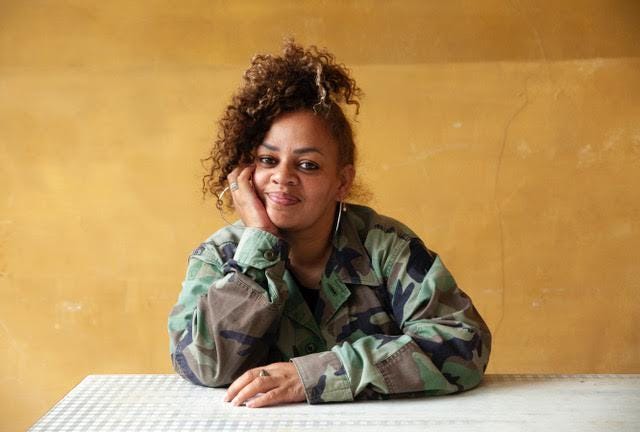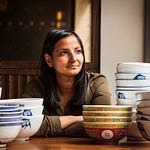In Episode 7, I talk with Ali Kakande, founder of Caribeats - a 'meals on wheels' type of organisation that provides delicious, Caribbean meals for vulnerable members of Hackney's Caribbean community who found themselves isolated and without support systems in the wake of 2020's pandemic. This episode looks at the idea of comfort and that everyone should be able to embrace their heritage through their own cultural food, regardless of their circumstances.
Here's the recipe for an OG Chicken & Crisp Butty which Ali likes to eat when she's on her own.
Find out more about Caribeats and their mission!
Volunteer with Caribeats here.
Episode 7 Transcript: interview with Ali Kakande and Julia Georgallis
Hello, welcome back to the How to Eat Alone podcast with me, Julia Georgallis. I’m a baker and I write about food. This podcast discusses issues surrounding loneliness, solitude and solo dining. In it, I talk to different people about various aspects of being alone and every episode comes with a recipe based on something we’ve discussed during the show. Each of these recipes is designed to be cooked by one person and one person only, because I find that most recipes are written for two or more people, which is a bit annoying for the solo cook!
Over the last few months I’ve been back and forth between Portugal, which is where I used to live and the UK, where I’m from and all this moving around really made me question where is it that I feel the most at home? As the daughter of immigrants - so my dad is first generation Cypriot and my mum is second generation Cypriot, the question of home and where is home is something that I’ve often asked myself. I do consider myself British, obviously, but there is always this idea that I’m kind of in the middle of two cultures - I’m not quite Cypriot and I’m not quite British… and then, on top of that, having also had the experience of emigrating to Portugal and living there for a little while made me question further, you know, where do I actually belong?
Something that really surprised me, when I first got back to London from Lisbon was how just how pleased I was to see, on Southgate High street - so just to fill you in Southgate is in North London, it’s where I was born, and it’s home to a quite considerable Greek and Turkish Cypriot community. So opposite Southgate tube station there’s this little cafe called Alex’s Cypriot Sandwiches and Soups. Underneath the main sign for Alex’s sandwiches it reads ‘Trahana and Avgolemono.’ Now, if you’re not Greek Cypriot, you won’t know what these are but they are incredibly traditional soups very specific to Cyprus. Trahana is a sour soup, it’s made from fermented or soured milk, rehydrated cracked wheat and usually you add halloumi cheese or feta cheese and then Avgolemono, which is my favourite, is a soup made from chicken stock and long grain rice and then you whisk an egg and lots of lemon juice, add that to the stock - and I usually like to top mine with cinnamon as well. Now, by no means are either of these soups particularly trendy. Trahana and Avgolemono are very much an acquired taste. It’s just not food that caters to British tastes like perhaps other Cypriot dishes. But it’s really important, and I didn’t actually realise how important it was, to have restaurants and cafes like Alex’s Cypriot Sandwiches and Soups shop that serve these unpopular, culturally diverse food. And I kind of realised that when I moved to Portugal, the foods that I missed from the UK was this kind of food - it was the idea that I could buy homecooking, food that tasted like my grandma’s food on my local high street even if it wasn’t necessarily part of mainstream culture. Eating things that taste like home very often makes us feel like we’re at home, and for people like me who are from a diaspora, which can be a disconnecting experience, that makes you feel connected, it makes you feel like you really do belong.
The pandemic affected how all of us accessed food, it might have been as something as simple as having to change the way we shopped, because we weren’t supposed to be going to the supermarket all the time. But then, you know, more seriously, it affected physical access for many people - so some people couldn’t get out of their house to get food because they were shielding, or perhaps they might have lost income and couldn’t physically afford to feed themselves and their families. And it also restricted access that diasporas and minority communities had to their own culturally appropriate food - so lots of restaurants serving minority communities might have had to shut down, or perhaps members of certain communities lived a little bit too far away from specialist shops so they weren’t supposed to be travelling all the way to access their own culture’s food or perhaps the ingredients. So you know there was lots of different ways that the coronavirus affected food access but perhaps not being able to access culturally appropriate food is something that someone who isn’t from an immigrant community might not have realised was a problem. And you know not having access to your own culture’s food can be really isolating.
Over lockdown disconnection and isolation trended upwards, right, but at the same time charity and people stepping in to help their own communities also trended upwards. And one of these people whose generosity and energy for helping people that seems to know no limits really is Ali Kakande who is the kind of accidental founder of an initiative called Caribeats. Caribeats is akin to meals on wheels but it’s the Caribbean version of meals on wheels, delicious, they provide dinners for the some of the most vulnerable and isolated members of a very notable Caribbean community living in and around London’s Hackney, which is one of the boroughs that really struggles with food poverty, even before Covid-19 showed up. I wanted to invite Ali on my podcast to discuss how and why she started this organisation and, you know, what are the issues that she is dealing with.
JG - Thanks for being on my podcast! (she laughs)
AK - You’re welcome
JG - Yeah! Maybe a great way to start would be to tell me a little bit about Caribeats and how it started.
AK - So when lockdown was announced not once did I think ‘oh, let me start a Caribbean food business - furthest thing from my mind…’ My mum was English and my Dad’s Jamaican - I’d grown up around food, and my auntie’s got a bakery, she had an outside catering business, making food for functions, weddings and all sorts! It’s hard work. So I didn’t…. it was never on my agenda for me to start anything to do with food. So anyway, lockdown's announced, it’s Sunday and I’m at home and I’m cooking summat - I’m cooking some curry chicken and hard food. Do you know what hard food is?
JG - What is hard food?
AK - Yeah! So hard food is yam, banana, maybe boiled plantain, dumpling, potatoes - some people call it Irish - and all together they call it ‘ard food. So I was cooking that with curry chicken. Anyway, so I was on this whatsapp - I was on all these mutual aid groups. You join a mutual aid group in your area. Say you lived in Stamford Hill, there would be a mutual aid group for that - I don’t know, people needed help, so I just joined quite a few. So this woman - I didn’t know her - said, ‘ok, I’ve got a request, I know someone who’s not going to be able to eat today, he’s struggling, could anybody, like, give him a meal.’ And I was like ‘Oh I could put him another plate out,’ so I responded. And she goes ‘oh could I put you in touch with his sister?’ And I was like ‘ok.’ Next thing, I’m talking to this woman, I think she was in Norwich and she was like ‘I can’t believe a stranger’s gonna go and give food to my brother’ and I was like ‘yeah it’s not a problem.’ Then I told my friend about it and she said ‘pick a meal up from me’ because she’s cooking. So I did and I went round there to this guy’s house. I knocked on the door and stepped back. This guy had learning difficulties and I think mental health difficulties and all his support had stopped, like, overnight - and I think food was a really important part of his life. His mum had passed away and it just so happened he said that the only food he wanted was Jamaican food and what I was cooking was that Caribbean food. So that was the start of Caribeats but we didn’t have a name.
JG - That’s just put a massive smile on my face! I mean I’m guessing he’s from a Jamaican background? It’s what he’s grown up with and sometimes that is all you wanna eat - You just want your mum’s cooking or your grandma’s cooking…
AK - It’s so interesting that you say that because I remember my aunt saying, who’s not from the Caribbean, she's a white lady - and she said ‘Al, imagine if I was in hospital in the Caribbean and the only food they was bringing me was the food from the Caribbean. She goes ‘I’ve not grown up on that, I’d have to eat it but it wouldn’t be of any comfort to me.’ She goes, it’s only the same thing here - if people are struggling and they’re requesting a certain cuisine because that’s what’s familiar to them, it shouldn’t be a problem. So, that’s how it started - me, three friends, two of the girls cooked and me and the other girl - we picked up the food and we delivered it. We went from 1 meal to 5 meals to 10 meals to, to where at one point, we were cooking between 70 and 100 meals.
JG - Wow.
AK - After about four weeks, because we was paying for it ourselves, we said we had to come up with a name because we wanted to do a little crowdfunder - so I was like Caribbean, Caribbean? Eats? CARIBEATS! And it just come out. So our name, we got our name and that was the start of it! I can’t describe how… the roads were… it was so… it was so eerie, you know, there was no traffic. I don't think I’ll forget that and me and the other driver we speak about it - how it was - she used to deliver with her son and she was so grateful because her son got to meet a lot of those people that we were delivering to. And she was grateful that he… he was seeing what people do who care about their neighbours, which is lovely.
JG - At the moment Caribeats kind of focuses on Hackney’s Caribbean community. I know you mentioned that there was that one guy who had lost all his support but, generally, who does Caribeats support, who are the people that you’re cooking for?
AK - So it’s a mixture - the elderly, the isolated, the carers, the people who’ve come out of hospital. In the height of lockdown it was quite a few people who had sickle cell - you know there was part of the community who couldn’t leave the house right? They were shielding for a very long time.
JG - Yeah.
AK - Quite a few people who were caring for their partners, husbands or wives and… One of my people who I was delivering to was a lady and she was married, she was living in a very small flat with her two daughters and her grandchildren. And every week I’d deliver her and every week she was really cheery, she was like ‘thankyou Ali, thankyou so much’ and just really really grateful. I didn’t know right, her husband had the most severe dementia - ahh man… so that meal meant so much to her once a week that she didn’t have to worry about food. Money was tight. There was a few other people like that where they were caring for their partner who got dementia. So, I remember early on, my friend was like ‘what’s the criteria? You know you’ve got to be strict with the criteria!’ and I was like… I dunno, right now, if someone is asking and they’re struggling I don’t want paperwork to be a barrier. What was apparent is our meals were sometimes giving carers a day off, or people who were, you know, having a day off from cooking…
JG - I’m not struggling and I don’t want to cook everyday… So if you’re struggling you do not want to cook everyday, you do not want to cook 3 meals a day - it’s a real treat to have someone cook for you.
AK - It was also the connection because, as time went on we got volunteers who would pick up the meals and go and deliver and the relationships just started to be built. I remember one guy, he was one of our volunteers, he was delivering to this woman - he was delivering week in week out and one day, I dunno, they must have been talking about sommat and she said, you do realise i’m blind right? And he was like ‘whaaat…’ When they spoke more that woman hadn’t been out of her house for 6 months - over 6 months - the meal was one thing but having him come every Monday at such a time it was, it was something she needed, so yeah… it’s a mixture of people. So we did that from the first week of lockdown and we carried on for like 15,16 months… and then, funding became a bit of an issue - I needed to take a break, I needed to take a pause and I needed to think about where I was going moving forward. Caribeats is needed, right? It really is, but how I was doing it wasn’t sustainable for the project, the organisation, or me. I built up so many relationships in that time and real support which is lovely - I was even at a meeting last night and one lady was saying ‘people really want YOU to succeed and they really want Caribeats to succeed’ so I’ve paused but in the background we’re gonna be a tenant in a base in Stamford Hill. Which is lovely. So I’m just fundraising for that and working out what that’s gonna look like.
JG - The minute I heard about this project, and it was like 9/10 months into the pandemic I really want Caribeats to succeed. And I wonder if we could talk about why is it that this has hit a bit of a nerve. I mean I guess it is all focused around the Caribbean community and the issues that they face - what is it about this project that makes everyone so excited, do you reckon?
AK - I think what lockdown did, right, was highlight the issues that people were already going through.
JG - Yeah
AK - The people, you know the recipients, the people that we’re serving, the isolation is not suddenly going to go away, the bank account’s not going to go up as soon as lockdown comes out. People who are on Universal credit may still be on it. My thing was about dignity - if somebody’s asking for help, they’re asking for help right now, they may not need that in the future - you may be the person giving the help, you may need help in the future. I did this because I could because I could at that time. Dignity was always really important to me and I wanted that for the people we were serving and so I think maybe the reason why some people kind of bought into it or wanted it to succeed, I decided that just because we were offering somebody help in a time of their life where they needed a bit of support that didn’t have to be dreary and grey, you know and how I spoke about it, I just spoke about it from the heart. I wasn't trying to pull on your heart strings. I think it was that. In that period we were all… there was reflection, right, people were reflecting, some quickly, some slowly, some deeply and for some, maybe it was fleeting but people kind of heard ‘people should be able to ask for what they want!’ If they’re struggling, it should be their cuisine. Obviously there’s loads of Caribbean food shops, right, but this was different, we were giving this food, so there weren’t a lot of people doing what we were doing. There wasn’t a lot of people cooking food that was culturally appropriate food. Whatever I do in the future, whatever happens in this new space, I’ve got to think about how I can run this as a business to be able to continue doing what I started - there will always be an essence of what I started and that was serving the community and that won’t change but how I do that might change.
JG - What are your plans for the future
AK - Basically getting in that new base, being able to cook from there. And I think there’s quite a few opportunities to be able to run a canteen. And, you know, people are asking me for cooking lessons and basic Caribbean cooking skills. So I think it’s about a model that we charge some people who we can charge and that then would enable us to give some of the meals away.
JG - Sign me up for Caribbean cooking classes!
AK - Yeah exactly!
JG - It’s really fun! It’s kind of like what you were saying about how it’s not - I mean, it does pull on some people’s heartstrings, but I don’t really think Caribeats is like that, I think it’s actually quite uplifting. Is there one dish where everyone’s like ‘ah that’s amazing… that reminds me of something… that reminds me of my mum or my grandma or my aunties…
AK - I think it’s different because of so many people are getting food, I think it was just the fact that it was cooked in a certain way. You know when we’d spoken to lots of people and people just give you feedback, you know, and it was just like ‘yeah it reminds me of home’ - we got that alot. I think it was about the preparation. You know I was in a meeting last night - it’s about food justice, this meeting, and one of the ladies, she’s a personal trainer - basically she was saying the government guidelines saying ‘this is healthy, this is healthy’- not once do they mention yams.
JG - You’re totally right. It is from a very English or British perspective. This is why it’s important for initiatives like Caribeats to exist - though it is changing slowly, government guidelines for food are still very much centered around the very British meat and two veg - but ultimately, and I think a lot of people know this, I think people with native British heritage don’t eat this way anymore - who’s eating a roast for dinner every night? British diets are so much more multicultural now - British food is chicken korma and spaghetti bolognese and it’s kebab and it’s yams!
AK - I remember being in some workplaces and it’d be alright let’s get Caribbean today, and who’s eating that Caribbean is not just Caribbean people.
JG - No, of course not! Like everyone eats different things every day and that’s actually balanced.
AK - When we were having this discussion last night one lady who works in body liberation...
JG - So I just need to interject here and explain what body liberation means, because I didn’t really know what it was. According to The Centre for Health and Wellbeing at the University of Vermont, body liberation is ‘the freedom from social and political systems of oppression that designate certain bodies as more worthy, healthy, and desirable than others. We do not believe that bodies that are white, able-bodied, cisgender, thin, or fit are superior, worthier, or inherently healthier than any other body’ - so that’s the definition and it also extends to the idea that certain diets eaten by certain ‘minority’ cultures are less healthy or less worthy or less correct than others.
AK - She was just saying that what we’re told is healthy and what we should be eating, actually in her experience, alright some people’s dishes may not be, I dunno, say her favourite dish is fried chicken and potato salad - ‘ah there’s too much fat, there’s too much this…’ but the benefits of maybe that being a comfort to that person can have such an effect it can outweigh the fact that, no one’s suggesting you eat that everyday, but there’s something in what that does, does that affect your wellbeing? Food is… it can bring people together. It can be lovely.
JG - Probably a really good way to end this would be to ask what your favourite thing to cook on your own is? What do you like to eat?
AK - I wouldn’t say… this is not cooking… this is far from cooking (giggles). One of my favourite things is a really nice piece of bread, whether that’s brown fresh bread or white bread, some roast chicken, tomatoes, black pepper, maybe a little bit of mayonnaise if I can be bothered, cut in half, bag of plain crisps - heaven!
JG - Oh my god. For me it would be salt and vinegar with the chicken though.
AK - OH! OH! Julia we don’t do salt and vinegar.
JG - WHHHAATTTT. Salt and vinegar crisp is my favourite crisps in the world.
AK - HOW!
JG - But like, in the chicken sandwich…
(They laugh)
AK - Oh… ok… ok… ok. But actually just putting your hand in and eating a salt and vinegar crisp… there’s got to be no alternative.
JG - Fine. Alright. I appreciate that. I feel that way about cheesy crisps, I can’t eat cheesy crisps. But ultimately your dish is like chicken, bread, tomatoes and a packet of plain crisps.
AK - Yeah. Up north where I’m from, we call it like a chicken butty and I can’t eat... very rarely can I have a sandwich without crisps - I don't know if it’s a Northern thing…
JG - I wonder if it comes from being a kid though, that’s what we used to do, isn’t it, when we had our pack lunches, I’d always put crisps in my sandwiches - I find that it reminds me of being a child.
AK - There is a comfort to it - and I think it’s because it can be made so quickly
JG - Yeah!
AK - Like you just need the bread, the chicken, the tomato and sometimes not even the tomato, and the crisps - And it’s not something you say ‘oh do you want me to make you one of these?’ (she laughs) But. If you bite into that it’s like mmm… ‘no we don’t need to add this - I love some sandwiches with other stuff in, you know put a bit of rocket in, put this in, put that in… but… sometimes… it’s a chicken sandwich, that’s alright as it is. Sometimes we overcomplicate some things, and I’m just like, no, can I have the original please.
JG - You’re a purist, you’re a sandwich purist.
I think my conversation with Ali revolved around the idea of comfort. And that marginalised communities like the Caribbean community who have lived in Britain for generations have the right to be comfortable and part of that is allowing vulnerable or isolated members to access that comfort in the form of food. Caribeats also tackles integration within Hackney’s Caribbean community, so it provides a platform for people like the delivery driver’s young son to directly connect with some of his neighbours who, pre-pandemic he might not have gotten a chance to really engage with. Ali shows that it’s nice to be nice, it’s cool to care and the food that we briefly talk about in this episode AND her suggestion of that really simple chicken and crisp butty is all about home cooking and home comforts and I know we often talk about comfort food as sometimes bad for us maybe, or not the healthiest of food, but like Ali mentions at the end there, sometimes there is a magic in food that lies beyond calorie counting. Sometimes food is about a connection.
I’d like to thank Ali for taking the time out to talk to me, because she’s a very very busy lady -
I’ve posted a recipe for that delightful Chicken Butty up on the podcast blog, which is howtoeatalone.substack.com. You can subscribe to the substack to receive extra recipes, news and recipes about the podcast. And you can also follow the pod on instagram, the handle is @howtoeatalonepodcast. Because I’m really extra in the kitchen and also in general life I made the chicken butty a bit fancy, because I always make things fancy even if I’m just cooking for myself. So I added lemony mayo to the chicken and tomato and I like using unusual crisp flavours - in this case, I’ve added Prawn Cocktail, which is my second favourite flavour of crisp after Salt and Vinegar. Talking about missing food of your country and about home comforts, whenever I’ve lived outside of the UK, I’ve always really missed British Crisps. All those ridiculous flavours! If you want to let me know which crisps you would put in a butty, I’m all ears. I’ll accept all entries apart from cheesy crisps because I hate cheesy crisps. Disgusting.
And as always, if you like this podcast, please share it with someone who you think might like it too. It’s now also available on Apple Podcasts which is great, so if this is where you get your pods from, gimme some stars!!! Thank you so much for listening to me and supporting this podcast and for being patient whilst I got my act together to record more episodes. I really hope you enjoyed being alone with me - I’ll see you soon for the next episode of How to eat alone, thanks for listening!
Find out more about 'How To Eat Alone' here.
Find out more about podcast host, Julia Georgallis here.
Music
Ben Beiny
What's Cooking
https://www.premiumbeat.com














Share this post